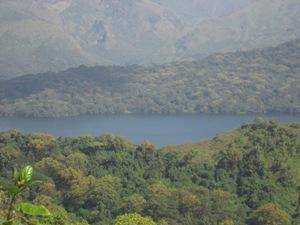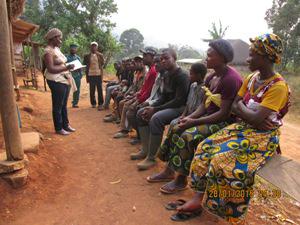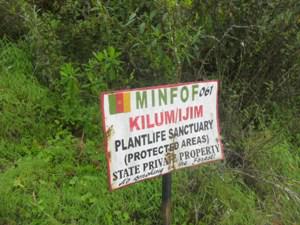Ache Neh Acha
This project aims at carrying out ethnomycological studies, assessing the threats and conservation status of macro-fungi in Kilum-Ijim forest reserve, and raising awareness on their conservation.

Side view of Lake Oku. © Ache Neh Acha.
The Kilum-Ijim Forest is an area of land which has extreme biodiversity. It is now the only extensive area of forest left anywhere in the Bamenda Highlands, and the largest area of Afromontane forest left in West and Central Africa. Most studies in this area have so far been focused on the conservation and diversity of birds, mammals and vascular plants with no concern for the fungi which though minimised, are principal decomposers and play pivotal roles in the ecological balance in the ecosystem.

Familiarising with Aboh community members. © Teke Ferdinand.
Macro-fungi play important roles in forest health as nutrient recyclers and through mycorrhizal association with plants yet are likely to be vulnerable to local and global extinction. Current research shows the potential of macro-fungi in improving human health, nutrition and in mycore mediation of polluted environments. In Cameroon, scanty information exist on macro-fungi species and their conservation status still remains unknown yet the species are disappearing at an alarming rate owing to anthropogenic activities, ongoing deforestation and climate changes making them vulnerable to extinction. Indigenous knowledge on the potentials of macro-fungi as food and medicine is still very limited. Therefore a study of this nature is important to ensure sustainability of this resource

Plantlife Sanctuary of Kilum-Ijim. Photo by Ache Neh Acha.
This project aims at making an assessment of the threats and conservation status of macro-fungi in the Kilum-Ijim forest reserve following the IUCN threat categories and raising awareness through educational programs on the need to sustainably exploit these macro-fungi. Ethnomycological studies will also be conducted on the socio-economic importance of these macro-fungi to the community.
Knowing the conservation status of these species will help to evaluate the highly endangered and vulnerable macro-fungi species, and to identify priority species for conservation actions.
The fact that indigenous knowledge on edible and medicinal macro-fungi will be documented, will help in the sustainability and conservation of this resource.
Documented knowledge from ethnomycological research could lead to scientific studies of identified fungi either for their use in cultivation, natural product research or in mycore mediation.
Awareness will be created on the need and simple practical measures for conservation of socio-economically important macro-fungi species through capacity building/educational programs planned in this project.
Identified and cultivatable edible and medicinal macro-fungi species will be put forward for low cost production technology studies, so that domestication can replace wild collection that depletes such macro-fungi from their natural habitats.